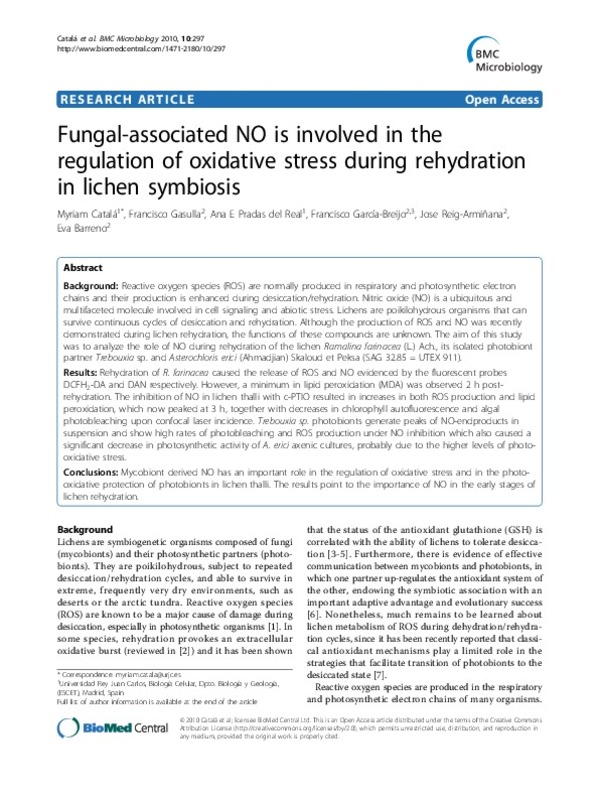JavaScript is disabled for your browser. Some features of this site may not work without it.
Buscar en RiuNet
Listar
Mi cuenta
Estadísticas
Ayuda RiuNet
Admin. UPV
Fungal-associated NO is involved in the regulation of oxidative stress during rehydration in lichen symbiosis
Mostrar el registro sencillo del ítem
Ficheros en el ítem
| dc.contributor.author | Catalá, Myriam
|
es_ES |
| dc.contributor.author | Gasulla Vidal, Francisco
|
es_ES |
| dc.contributor.author | Pradas del Real, Ana Elena
|
es_ES |
| dc.contributor.author | García-Breijo, Francisco-José
|
es_ES |
| dc.contributor.author | Reig Armiñana, José
|
es_ES |
| dc.contributor.author | Barreno Rodriguez, Eva
|
es_ES |
| dc.date.accessioned | 2017-07-12T07:06:29Z | |
| dc.date.available | 2017-07-12T07:06:29Z | |
| dc.date.issued | 2010-11-22 | |
| dc.identifier.issn | 1471-2180 | |
| dc.identifier.uri | http://hdl.handle.net/10251/84978 | |
| dc.description.abstract | [EN] Background Reactive oxygen species (ROS) are normally produced in respiratory and photosynthetic electron chains and their production is enhanced during desiccation/rehydration. Nitric oxide (NO) is a ubiquitous and multifaceted molecule involved in cell signaling and abiotic stress. Lichens are poikilohydrous organisms that can survive continuous cycles of desiccation and rehydration. Although the production of ROS and NO was recently demonstrated during lichen rehydration, the functions of these compounds are unknown. The aim of this study was to analyze the role of NO during rehydration of the lichen Ramalina farinacea (L.) Ach., its isolated photobiont partner Trebouxia sp. and Asterochloris erici (Ahmadjian) Skaloud et Peksa (SAG 32.85 = UTEX 911). Results Rehydration of R. farinacea caused the release of ROS and NO evidenced by the fluorescent probes DCFH2-DA and DAN respectively. However, a minimum in lipid peroxidation (MDA) was observed 2 h post-rehydration. The inhibition of NO in lichen thalli with c-PTIO resulted in increases in both ROS production and lipid peroxidation, which now peaked at 3 h, together with decreases in chlorophyll autofluorescence and algal photobleaching upon confocal laser incidence. Trebouxia sp. photobionts generate peaks of NO-endproducts in suspension and show high rates of photobleaching and ROS production under NO inhibition which also caused a significant decrease in photosynthetic activity of A. erici axenic cultures, probably due to the higher levels of photo-oxidative stress. Conclusions Mycobiont derived NO has an important role in the regulation of oxidative stress and in the photo-oxidative protection of photobionts in lichen thalli. The results point to the importance of NO in the early stages of lichen rehydration. | es_ES |
| dc.description.sponsorship | This project was funded by the Spanish Ministry of Education and Science [project numbers CGL2006 12917 C02 0 and CGL2009 13429 C02 01], project Prometeo 2008/1/4 of the Generalitat Valenciana and the project AECID PCI/A/024755/09 of the Spanish Ministry of Foreign Affaires. We are grateful to F. Gasulla, J. Gimeno-Romeu, E. Barreno, (ICBIBE, University of Valencia) and A. Guera (Plant Biology, University of Alcala) for communicating unpublished data, to Dr. R. Catala (CIB, Madrid), Dr. P. D'Ocon (UVEG, Valencia) and Dr. J. Medina (INIA, Madrid) for critical revision of the manuscript, and J. L. Rodriguez Gil for MDA protocol optimization. English revision was done by Wendy Ran. | |
| dc.language | Inglés | es_ES |
| dc.publisher | BioMed Central | es_ES |
| dc.relation.ispartof | BMC Microbiology | es_ES |
| dc.rights | Reconocimiento (by) | es_ES |
| dc.subject | Photosynthetic electron-transport | es_ES |
| dc.subject | II reaction center | es_ES |
| dc.subject | Non-heme iron | es_ES |
| dc.subject | Nitric-oxide | es_ES |
| dc.subject | Desiccation tolerance | es_ES |
| dc.subject | Photosystem-II | es_ES |
| dc.subject.classification | BOTANICA | es_ES |
| dc.subject.classification | BIOLOGIA VEGETAL | es_ES |
| dc.title | Fungal-associated NO is involved in the regulation of oxidative stress during rehydration in lichen symbiosis | es_ES |
| dc.type | Artículo | es_ES |
| dc.identifier.doi | 10.1186/1471-2180-10-297 | |
| dc.relation.projectID | info:eu-repo/grantAgreement/MEC//CGL2006-12917-C02-01/ES/FOTOBIONTES DE LIQUENES: DIVERSIDAD MORFOLOGICA, GENETICA Y FUNCIONAL. RESPUESTAS FRENTE A CONDICIONES ADVERSAS./ | es_ES |
| dc.relation.projectID | info:eu-repo/grantAgreement/GVA//PROMETEO08%2F2008%2F174/ | es_ES |
| dc.relation.projectID | info:eu-repo/grantAgreement/MAEC//A%2F024755%2F09/ES/CARACTERIZACIÓN GENÉTICA, FISIOLÓGICA Y ANATÓMICA DE LOS LÍQUENES BIOINDICADORES DE BOSQUES SUSTENTABLES Y VULNERABLES AL CAMBIO CLIMÁTICO. PARQUE NACIONAL EL CHICO (HIDALGO) Y FSC EN SIERRA DE JUÁREZ (OAXACA), MÉXICO/ | es_ES |
| dc.relation.projectID | info:eu-repo/grantAgreement/MICINN//CGL2009-13429-C02-01/ | |
| dc.rights.accessRights | Abierto | es_ES |
| dc.contributor.affiliation | Universitat Politècnica de València. Escuela Técnica Superior de Ingeniería Agronómica y del Medio Natural - Escola Tècnica Superior d'Enginyeria Agronòmica i del Medi Natural | es_ES |
| dc.contributor.affiliation | Universitat Politècnica de València. Departamento de Ecosistemas Agroforestales - Departament d'Ecosistemes Agroforestals | es_ES |
| dc.description.bibliographicCitation | Catalá, M.; Gasulla Vidal, F.; Pradas Del Real, AE.; García-Breijo, F.; Reig Armiñana, J.; Barreno Rodriguez, E. (2010). Fungal-associated NO is involved in the regulation of oxidative stress during rehydration in lichen symbiosis. BMC Microbiology. 10. https://doi.org/10.1186/1471-2180-10-297 | es_ES |
| dc.description.accrualMethod | S | es_ES |
| dc.relation.publisherversion | http://dx.doi.org/ 10.1186/1471-2180-10-297 | es_ES |
| dc.type.version | info:eu-repo/semantics/publishedVersion | es_ES |
| dc.description.volume | 10 | es_ES |
| dc.relation.senia | 38989 | es_ES |
| dc.identifier.pmid | 21092214 | en_EN |
| dc.identifier.pmcid | PMC3003266 | |
| dc.contributor.funder | Ministerio de Educación y Ciencia | |
| dc.contributor.funder | Generalitat Valenciana | |
| dc.contributor.funder | Ministerio de Asuntos Exteriores y Cooperación | es_ES |
| dc.contributor.funder | Ministerio de Ciencia e Innovación | es_ES |








